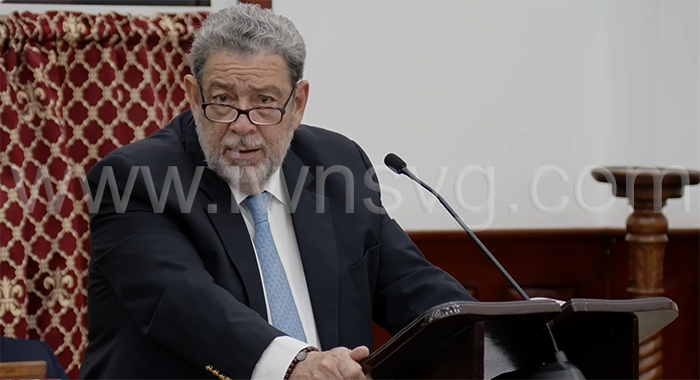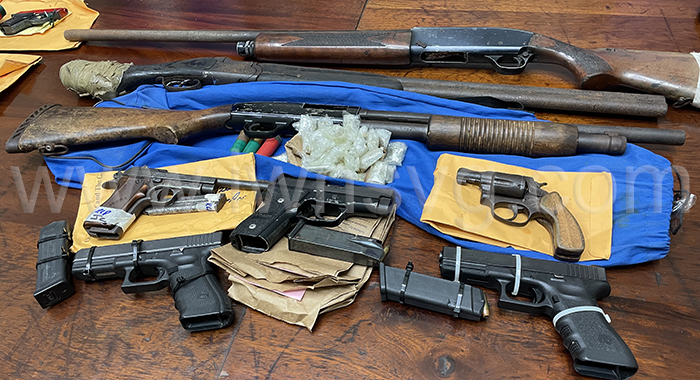St. Vincent and the Grenadines has passed stiffer penalties for some firearm offences and created new offences, including against trafficking in firearms and the 3D printing of firearms.
In presenting the amendment to lawmakers, Prime Minister Ralph Gonsalves, who is also minister of national security, said that while the penalties are not at the highest in the region, they have moved from “the middle range reflecting the public’s serious concern about gun crimes” and the consensus among legislators.
The revised law moved from EC$20,000 and seven years in prison to EC$25,000 and 10 years imprisonment, or both, the maximum sentence a magistrate can impose on a person guilty of possession of an unlicensed firearm or who forges or counterfeits any license or permit.
“This is not the first time in our law that the magistracy will have the authority to impose a sentence of up to 10 years,” said Gonsalves, a lawyer who is also minister of legal affairs.
“In recent times, particularly in relation to drug trafficking offences, for example, a magistrate can go to that level of penalty.”
He said that with the stiffer penalty, a person is likely to end up with a four-year prison sentence, rather than 18 months after the sentencing guidelines are applied.
“I’m not a judge; I’m not a magistrate. I’m just as an intelligent applier of the guidelines,” he said.
On summary conviction, possession of a prohibited weapon will now attract a sentence of up to 15 years in prison — up from 10 years — and a fine of EC$50,000 — up from EC$20,000.
On indictment, the maximum penalty for the same offence moves from 20 to 25 years imprisonment.
In the case of a restricted weapon, the penalty has moved from five years to 10 on summary conviction, and on indictment, from $25,000 to $75,000. The maximum prison term has increased to 20 years, up from 15.
On summary conviction, a person who possesses a firearm with intent to injure is liable to a fine of up to EC$15,000 — 50% more than was previously the case — and instead of five years in prison, they can be sentenced to up to seven.
However, on indictment, the maximum sentence moves from a fine of EC$30,000 to EC$35,000 and from 20 years to 22 years imprisonment.
“Now, this is a very serious offence. Because you notice, you don’t actually have to injure the person,” the prime minister said.
“Once you have the firearm, with intent to injure the person or to endanger the life, the offence is triggered.”
He noted that if someone is injured, the offender can be charged with inflicting grievous bodily — maiming, disfiguring or disabling – which carries a maximum sentence of life imprisonment.
Possession of an imitation firearm could attract a sentence of seven years, up from five if the matter is heard by a magistrate.
However, at the High Court, the maximum sentence is now 30 years, up from 25.
“It’s a serious business to have a firearm of imitation,” Gonsalves said, adding that imitation firearms are sometimes used in the commission of other crimes, including rape.
Under the law, imitation firearm means any toy or object having the appearance of a firearm, whether or not it is capable of discharging a shot, bullet or other missile.
The prime minister said that he knows people would ask whether this includes a child’s water gun toy.
“Well, I don’t think water guns look like it’s capable of discharging a shot, bullet or missile. And in any event, the prosecutor would be quite silly if they prosecute somebody with a water gun, unless, of course, the circumstances…” he said.
The revised law creates a new offence — possession of a ghost gun or a 3D-printed firearm.
“You have in that an increasing number of those things are happening with ghost guns or 3D printed firearms,” Gonsalves said.
Under the law, a ghost gun means “a firearm including a frame or a receiver that lacks a unique serial number engraved or cased in metal alloy on the frame or receiver but does not include a firearm rendered permanently inoperable or that is not required to have a serial number”.
Gonsalves said there are a number of people throughout the region who have ghost guns and 3D-printed firearms.
“Homemade guns, you know. And you have the computer, you have the materials and you make yourself the gun. So, we have to have a particular offence to meet these new technologies,” he said.
Another offence is classified as trafficking the possession of two or more unlicensed firearms.
Trafficking includes importing, exporting, acquiring, delivering, selling or transferring firearms or prohibited weapons.
A magistrate can charge a person convicted of this offence up to EC$200,000 or jail them for up to 15 years or both.
“So I want those who have two weapons to understand that this bill is not a joke,” the prime minister said, noting that the firearms amnesty that began on March 1 will run until May 31.
“You have your gun, give it in now. Because when this comes into being, the penalty going to be stiffer and if you have two in your possession, you could be out of circulation for a very long time,” Gonsalves said.

The penalty for offences related to the restriction on the sale of firearms moved from EC$7,000 to $10,000 or five years imprisonment — up from three years.
“… if you purchase, acquire, sell or transfer a prohibited weapon summarily, it moves from five years to seven years. And on indictment, it moves on 20 years to 25 years.”
Gonsalves said the law contemplates people who want to be ingenious.
It says a person other than the holder of a valid firearm license shall not shorten the barrel of a shotgun to a length of less than 20 inches, convert into a firearm anything which is not a firearm, convert into a restricted weapon anything which is not a restricted weapon, or convert into a prohibited weapon anything which is not a prohibited weapon.
For a person who contravenes that section of the law, on summary conviction, the term moves from five years to seven years and on indictment from 15 years to 17 years.
Importing or exporting prohibited weapons without a permit now attracts up to 15 years imprisonment, up from 10 on summary conviction and 25 years on indictment, up from 20.
The prime minister said that penalties alone will not address the nation’s gun problem.
“Like, for instance, guns which are coming in,” he said, adding that the government has installed detection equipment at the port in Campden Park.
“And the one is being put together for Kingstown and we have, also, facilities out at Argyle,” the prime minister said.
“And it is painful for me to see young people, especially the bulk of them, overwhelmingly, almost 100% of them, young males, getting involved with this fascination with guns,” Gonsalves said.
“I say to you, you’re mashing up your life; if you have a firearm, you’re mashing it up.
“And when you use it, I’m saying to you the evidence is all around you, you’re either going to go to jail for a long time, or you’re going to die.
“Or you go to jail, and when you come out, if you continue, you’re going to die before you reach your allotted period of time.”
The prime minister urged people to use the amnesty to hand in illegal firearms and ammunition.
He further urged parents and other relatives to encourage people to hand in their unlicensed firearms and ammunition.






